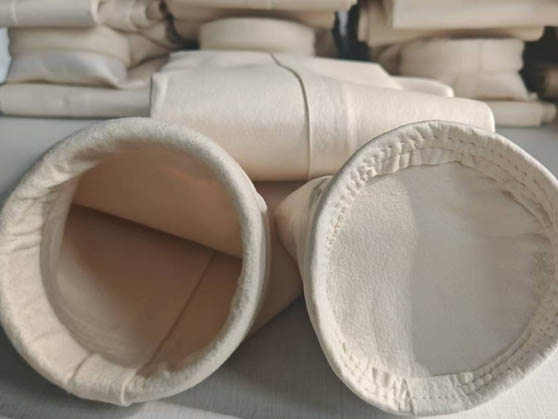Filter bags (also known as dust collection bags or Dust Collector Bag) are the core component of baghouse dust collectors, often referred to as the “heart of the baghouse system.” As a critical part of dry/wet high-efficiency dust removal equipment, filter bags use advanced filtration mechanisms to separate dust from industrial exhaust gases, ensuring compliance with environmental emission standards.
How Filter Bags Work?
Filter bags are made of woven fiber fabric and operate based on inertial impaction and interception principles:
Dust Capture Process: When dust-laden gas enters the collector, dust particles collide with and adhere to the filter fibers due to inertial forces.
Filtration & Separation: Dust accumulates on the outer surface of the bag, while clean air passes through the fabric into the inner chamber.
Structural Support: An internal cage prevents bag collapse and aids in dust dislodgement and redistribution.
In pulse-jet and compartmentalized pulse baghouses, dust primarily collects on the outer surface, significantly improving filtration efficiency and cleaning performance.
Three Main Types of Dust Collector Bags
1. Standard-Temperature Filter Bags
Materials: Polyester, polypropylene, acrylic fibers (non-woven process)
Key Features:
Excellent breathability
High surface smoothness
Dimensional stability
Easy dust release
Applications: General industrial dust control & standard-temperature gas filtration
2. Medium-Temperature Filter Bags
Advancements: With technological progress, China has developed high-performance filter media for harsh conditions.
Primary Material: Polyphenylene sulfide (PPS) fiber series
Special Treatments: Waterproof, oil-resistant, anti-corrosion coatings
Performance: Maintains optimal filtration in moderately demanding environments
3. High-Temperature Filter Bags
Common Materials:
Microglass fibers
Manufacturing: High-temperature resistant weaving/non-woven processes
Key Advantages:
Exceptional thermal stability
Ultra-high filtration efficiency
Extended service life
Special Applications:
Extreme conditions: DWD material
Standard dust collection: Polyester variants

5 Key Factors for Selecting Filter Bags
To ensure optimal dust collection system performance, consider:
Gas Temperature – Select appropriate heat-resistant materials
Humidity & Chemical Composition – Assess moisture and corrosive elements
Particle Characteristics – Size, shape, and physical properties
Dust Load Concentration – System design capacity
Filtration Velocity – Critical for efficiency and bag lifespan
Cleaning Mechanism – Impacts material selection and bag structure
Professional Industrial Dust Collection Solutions
As a leading dust collector manufacturer, Darko combines 10+ years of R&D expertise to deliver high-performance filtration solutions worldwide. Our products serve diverse industries, ensuring efficient filtration, extended durability, and compliance with strict environmental standards.
Darko's Competitive Advantages
✔ High Filtration Precision – Premium fibers capture fine particles effectively
✔ Heat & Chemical Resistance – Full-range solutions (standard/medium/high temp)
✔ Extended Service Life – Enhanced weaving technology reduces wear
✔ Easy-Clean Design – Surface treatments improve dust release, lowering maintenance
Industries Served
Power & Energy – Coal plants, biomass boilers, waste incineration
Cement & Construction – Raw mills, clinker coolers, packaging dust
Steel & Metallurgy – Blast furnace gas, converter emissions, sintering
Chemicals & Pharma – Dust recovery, toxic gas filtration, process emissions
Wood & Food Processing – Sawdust, flour dust, additive filtration
Why Choose Darko?
We provide complete dust control solutions, including:
🔹 Process Analysis – Tailored material recommendations
🔹 Custom Manufacturing – Sizes, materials, coatings (water/oil/flame-resistant)
🔹 Technical Consulting – Cleaning optimization & energy-saving retrofits
Darko – Making Clean Production More Efficient!
Contact our engineering team for free consultations & product samples!

